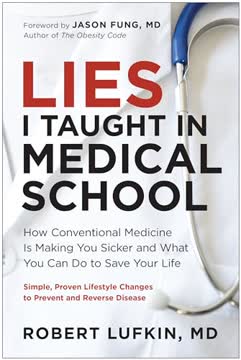重点摘要
1. 现代饮食引发全球心理健康危机
近十亿人正饱受心理健康障碍困扰,其中包括全球五分之一的儿童和青少年。
标准的美国饮食正严重损害我们的心理健康。这种饮食以精制碳水化合物、植物油和超加工食品为特征,促使大脑产生炎症、氧化应激和胰岛素抵抗。这些因素共同导致情绪障碍、焦虑、认知衰退及其他心理健康问题。问题不仅限于美国,随着西方饮食模式的全球传播,心理健康问题也随之蔓延。
现代饮食中的主要罪魁祸首:
- 精制碳水化合物(糖、面粉、加工谷物)
- 工业种子油(大豆油、玉米油、菜籽油)
- 缺乏必需营养素的超加工食品
- 过量饮酒
2. 炎症与氧化应激是精神疾病的关键驱动因素
高血糖通过促进过度氧化和炎症,危害大脑健康。
大脑中的慢性炎症在多种精神疾病中扮演重要角色,尤其是抑郁症。摄入精制碳水化合物导致血糖升高,进而在大脑中形成晚期糖基化终产物(AGEs)。这些黏性分子引发炎症反应和氧化应激,损伤脆弱的大脑结构,令细胞能量工厂——线粒体不堪重负。
大脑炎症的后果:
- 神经递质(如血清素、谷氨酸)生成受阻
- 抑郁、焦虑及认知衰退风险增加
- 大脑细胞和结构可能遭受长期损害
- 大脑细胞能量生成受损
3. 胰岛素抵抗是大脑健康的隐形敌人
胰岛素抵抗在美国及全球许多国家已达到流行水平。
胰岛素抵抗常被忽视,影响超过半数美国人,是心理健康问题的重要风险因素。当细胞对胰岛素产生抵抗时,大脑难以有效利用葡萄糖作为能量,导致“脑能量不足”状态。这种能量缺乏表现为情绪波动、认知障碍,并增加阿尔茨海默病等神经退行性疾病的风险。
胰岛素抵抗的表现:
- 空腹胰岛素水平升高
- 甘油三酯高,HDL胆固醇低
- 腰围增大
- 脂肪肝
- 皮肤赘生物或色素沉着(黑棘皮症)
4. 生酮饮食在治疗心理健康问题上展现潜力
我坚信营养干预能带来深远影响和重要益处,这使我认为这是精神科护理未来的发展方向。
生酮饮食是一种高脂肪、低碳水化合物的饮食方式,正成为治疗多种心理健康问题的有力工具。通过将大脑的主要能量来源从葡萄糖转变为酮体,该饮食解决了许多导致精神疾病的代谢问题。临床研究和病例报告显示,生酮饮食对抑郁症、双相情感障碍、精神分裂症和焦虑症等均有积极效果。
生酮饮食对心理健康的益处:
- 降低炎症和氧化应激
- 改善线粒体功能
- 促进神经递质平衡
- 增加GABA(镇静神经递质)生成
- 可能减少或停用精神科药物
5. 动物性食物对大脑营养至关重要
肉类对你有益。
动物性食物提供了大脑健康所需的最易吸收且完整的必需营养素。与普遍误解相反,肉类(包括红肉)并非天生有害,反而对心理健康有诸多益处。它们含有所有必需氨基酸、关键脂肪酸如DHA和EPA,以及高度吸收的维生素和矿物质。
动物性食物中的关键大脑营养素:
- 完整蛋白质,含所有必需氨基酸
- DHA和EPA(欧米伽-3脂肪酸)
- 高吸收率的维生素B12、铁和锌
- 胆碱,神经递质合成必需
- 肌酸和肌肽,支持大脑能量代谢
6. 大多数植物性食物含有毒素和抗营养素,可能损害大脑健康
所有植物都用化学武器自我防御,而种子是防御最严密的部分,因此种子类食物含有多种恶性分子,每种都以独特方式伤害你。
植物进化出多种防御机制以抵御捕食者,包括人类。这些防御物质包括阻碍必需矿物质吸收的抗营养素,以及可能干扰大脑功能的毒素。虽然部分植物性食物可纳入健康饮食,但必须了解其潜在风险,并通过适当处理减少有害影响。
有害植物化合物:
- 凝集素(存在于谷物、豆类和茄科植物)
- 植酸(种子、谷物和豆类中的矿物质结合物)
- 草酸盐(菠菜、大黄及部分坚果中)
- 甲状腺抑制物(干扰甲状腺功能的化合物)
- 水杨酸盐(许多水果和蔬菜中的天然杀虫剂)
7. “安静饮食”方法助力优化心理健康
我称这些方案为“安静”,因为它们独特地调整以减轻对代谢、肠道、甲状腺、免疫系统、神经系统和线粒体的负担,从而带来超越传统古饮、生酮和食肉饮食的益处。
安静饮食方法着重减少炎症、氧化应激和胰岛素抵抗,同时尽量避免植物毒素和常见食物敏感源。此策略对慢性疾病、食物不耐受或难治性心理健康问题尤为有效。作者提出三种变体:安静古饮、安静生酮和安静食肉。
安静饮食的核心原则:
- 强调营养密集的动物性食物
- 限制或剔除谷物、豆类和乳制品
- 选择低毒、易消化的植物性食物
- 根据个体需求调整碳水化合物摄入
- 消除常见食物敏感触发因素
- 通过策略性进食时间促进代谢灵活性
8. 怀孕及早期儿童营养对终生大脑健康至关重要
母亲能给予孩子的最大礼物之一,是一个庞大、美丽且健康的大脑。
生命的前1000天,从受孕到两岁,是大脑发育的关键期。此阶段的适当营养为终生心理健康奠定基础。胆碱、DHA、铁和叶酸等必需营养素在大脑形成和功能中发挥重要作用。怀孕及早期儿童期摄入动物性食物尤为重要,以确保充足的脑部营养。
早期大脑发育的关键营养素:
- 胆碱:神经递质合成和基因调控必需
- DHA:大脑细胞结构与功能关键
- 铁:保障大脑氧合和能量生成
- 叶酸:DNA合成及神经管形成必需
- 碘:甲状腺激素生成及大脑发育关键
9. 目前缺乏植物性饮食对心理健康益处的证据
目前尚无科学证据帮助我们理解素食和纯素饮食对精神疾病的影响。
**尽管植物性饮食常被宣传为健康之选,**但缺乏支持其对心理健康有益的证据。严格的植物性饮食可能导致维生素B12、DHA和铁等关键脑营养素缺乏。作者认为,植物性饮食的健康益处更多源于避免了加工食品,而非完全摒弃动物产品。
植物性饮食对心理健康的潜在风险:
- 维生素B12缺乏,导致神经问题
- DHA摄入不足,影响大脑结构与功能
- 铁缺乏,影响认知和情绪
- 锌缺乏,与抑郁和焦虑相关
- 胆碱缺乏,影响记忆和认知表现
10. 个性化饮食策略是改善心理健康的关键
安静饮食的目标是找到最少限制且最愉悦的饮食方式,以支持你的心理和身体健康。
**饮食方案非一刀切,**作者强调个性化的重要性,需考虑代谢健康、食物敏感性及具体心理健康问题。通过先采用较严格的方案(如安静古饮),再系统性地逐步重新引入食物,个体可找到最适合自身心理健康的饮食模式。
个性化饮食的步骤:
- 先采用安静古饮2至6周
- 监测代谢指标和心理症状
- 如有需要,转为安静生酮以增强效果
- 多重敏感者可考虑安静食肉
- 逐步重新引入食物,寻找个人“最佳点”
- 持续监测并根据结果调整饮食方案
最后更新日期:
FAQ
What's Change Your Diet, Change Your Mind about?
- Focus on Nutrition and Mental Health: The book explores the link between dietary choices and mental health, suggesting that poor diet can lead to mental health issues.
- Nutritional Psychiatry: It introduces nutritional psychiatry, emphasizing food's role in managing mental health conditions.
- Personal Stories and Evidence: The author shares anecdotes and clinical experiences to show how dietary changes can improve mood and cognitive function.
Why should I read Change Your Diet, Change Your Mind?
- Empowering Dietary Changes: The book offers actionable advice on modifying your diet to enhance mental health.
- Challenging Conventional Wisdom: It questions mainstream dietary guidelines, encouraging readers to rethink their food choices.
- Scientific Backing: Georgia Ede, MD, supports her claims with scientific research, making the book credible and informative.
What are the key takeaways of Change Your Diet, Change Your Mind?
- Diet Affects Mental Health: The book emphasizes that diet significantly impacts mood, anxiety, and cognitive function.
- Whole Foods Importance: Advocates for a diet rich in whole foods, particularly animal products, while cautioning against processed foods.
- Metabolic Health Matters: Links insulin resistance to mental health disorders, highlighting the importance of metabolic health.
What is the ketogenic diet as described in Change Your Diet, Change Your Mind?
- Low-Carbohydrate, High-Fat: The ketogenic diet reduces carbohydrate intake, shifting the body into ketosis to burn fat for fuel.
- Mental Health Benefits: It helps alleviate mental health disorder symptoms by stabilizing blood sugar and reducing brain inflammation.
- Nutrient-Rich Foods: Encourages focusing on whole, nutrient-dense foods to ensure adequate nutrition and support brain health.
How does Change Your Diet, Change Your Mind address major mental health conditions?
- Case Studies: Includes case studies showing improvements in depression, anxiety, and bipolar disorder through dietary changes.
- Scientific Evidence: References studies supporting ketogenic diets' efficacy in treating mental health issues.
- Holistic Treatment: Advocates for incorporating dietary strategies into mental health care alongside traditional treatments.
What specific dietary changes does Georgia Ede recommend in Change Your Diet, Change Your Mind?
- Eliminate Processed Foods: Advises avoiding ultraprocessed foods, refined carbohydrates, and sugars.
- Incorporate Whole Foods: Emphasizes consuming whole, nutrient-dense foods, particularly animal products.
- Focus on Healthy Fats: Encourages including healthy fats like avocados, olive oil, and fatty fish to support brain function.
What role does insulin resistance play in mental health according to Change Your Diet, Change Your Mind?
- Silent Epidemic: Describes insulin resistance as a widespread condition leading to mental health issues like depression and anxiety.
- Energy Deficits: Explains that insulin resistance restricts the brain's energy access, causing cognitive and emotional difficulties.
- Connection to Alzheimer’s: Highlights the link between insulin resistance and Alzheimer’s, suggesting managing insulin levels can prevent cognitive decline.
What are the dangers of processed foods as discussed in Change Your Diet, Change Your Mind?
- Inflammation and Oxidative Stress: Processed foods promote inflammation and oxidative stress, damaging brain health.
- Nutrient Deficiency: Often nutrient-poor, lacking essential vitamins and minerals for optimal brain function.
- Addictive Properties: Argues that ultraprocessed foods can be addictive, leading to unhealthy eating patterns and mental health issues.
How does Change Your Diet, Change Your Mind address food addiction and binge eating?
- Dietary Interventions: Presents the ketogenic diet as effective for reducing cravings and binge eating by stabilizing blood sugar.
- Case Studies: Shares success stories of individuals overcoming food addiction through dietary changes.
- Focus on Whole Foods: Advocates for a diet rich in whole foods to help regain control over eating habits.
What are the symptoms of "keto flu" mentioned in Change Your Diet, Change Your Mind?
- Common Symptoms: Includes fatigue, headache, irritability, and difficulty concentrating during the initial ketogenic diet phase.
- Duration: Symptoms usually resolve within one to two weeks, but some may experience low energy for up to six weeks.
- Management Strategies: Suggests staying hydrated, replenishing electrolytes, and easing into the diet to mitigate symptoms.
What are the recommended electrolyte requirements during keto-adaptation in Change Your Diet, Change Your Mind?
- Sodium Intake: Recommends about 5 grams (5,000 mg) of sodium daily, achieved by salting food and consuming salty beverages.
- Potassium and Magnesium: Suggests 4 grams (4,000 mg) of potassium and 400 mg of magnesium daily during the transition.
- Homemade Electrolyte Solution: Provides a recipe using Morton Lite salt and baking soda dissolved in water.
What are the best quotes from Change Your Diet, Change Your Mind and what do they mean?
- “Most of us have been feeding our brains improperly our entire lives.”: Highlights the lack of awareness about diet's impact on mental health.
- “Changing your mind with diet requires changing your mind about diet.”: Emphasizes the need for a paradigm shift in viewing food's role in mental well-being.
- “If you don’t want to take medication, there are innovative dietary strategies you probably haven’t tried yet.”: Encourages exploring dietary changes as alternatives to medication for mental health management.
评论
《改变饮食,改变思维》一书评价不一。许多读者赞赏其基于科学的营养与心理健康方法,认为内容详实且具有改变生活的力量。大家特别认可书中对大脑功能及饮食影响的深入解析。然而,也有部分读者批评作者对植物性食物持强烈反对态度,且大力推崇高肉类饮食。批评者认为此书可能助长饮食失调,且缺乏细致的平衡视角。尽管存在分歧,大多数读者仍然认可该书对饮食与心理健康关系的探讨价值,哪怕未完全采纳其建议。
Similar Books













